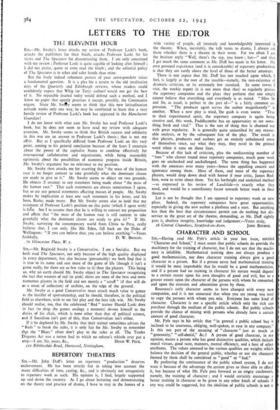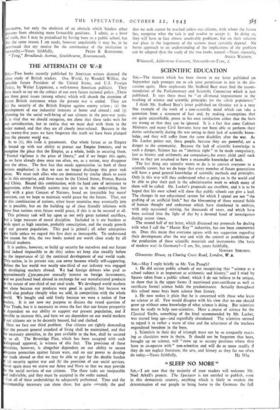CHARACTER AND SCHOOL
Sta,—Having read Mr. Fyfe's article in your last issue, entitled "Character and School," I must assert that public schools do provide the machinery for the training of character, but I do not say that the machi- nery is infallible. Mathematical training does not always produce a good mathematician, nor does character training always give a good character to a person. But if a person never had mathematical training it would be most improbable that he would be a good mathematician, and if a person had no training in character his nature would depend to a certain extent upon his own thoughts of good and evil, but to a greater extent upon the character of the persons with whom he consorted) and upon the restraint and admonition given by them.
Rousseau's early character seems to have changed with every new companion, and it is not unnatural that when you are young you tend to copy the persons with whom you mix. Everyone has some kind of character. Character is not a specific article which only the rich can purchase through the medium of the public schools. But public schools provide the chance of mixing with persons who already have a certain amount of good character.
Mr. Fyfe says in his article that " in general a public school boy is inclined to be courteous, obliging, well-spoken, at ease in any company.' Is this not part of the meaning of k` character " just as much as " generosity," " self-denial," &c.? A person of good character, in my opinion, means a person who has good distinctive qualities, which include moral virtues, good taste, manners, mental efficiency, and a host of other attributes. The values annexed to the various qualities are weights which balance the decision of the general public, whether or not the character formed by them shall be considered as " good " or " bad."
By preferring the continuance of the public school system, I do not want it because of the advantage the _system gives to those able to afford it, but because of what Mr. Fyfe puts forward as an empty catchword, namely, the training of character ; and I would certainly encourage a better training in character to be given in any other kinds of schools if any way could be suggested, but the abolition of public schools is not a corrective, but only the abolition of an obstacle which 'hinders other persons from obtaining more favourable positions. I admit, as a lover of truth, that I may be prejudiced by having been to a public school, but for the same reason I am ready, however unpalatable it may be, to be convinced that my motive for the continuance of the institution is



























 Previous page
Previous page